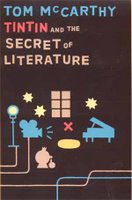 I suppose when a popular book gets old enough, someone out there will start asking the inevitable question: "Is this literature?"
I suppose when a popular book gets old enough, someone out there will start asking the inevitable question: "Is this literature?"I, for one, grew up with a healthy dose of Tintin (along with that other illustrated character from the French-speaking world, Asterix), but I never thought to stop and ponder that what I was reading, these sublime adventures by Hergé, were actually literature.
Tom McCarthy, however, has. In fact, he's not only stopped and pondered, he also did some good ol'-fashioned Tintin-esque detective work, then proceeded to write a book about it, entitled "Tintin and the Secret of Literature":
McCarthy takes a cue from Tintin himself, who spends much of his time tracking down illicit radio signals, entering crypts and decoding puzzles and suggests that we too need to 'tune in' and decode if we want to capture what's going on in Hergé's work. What emerges is a remarkable story of hushed-up royal descent, in both Hergé's work and his own family history.The Economist, though, thinks McCarthy's effort is rather bleh.
Comments
Post a Comment